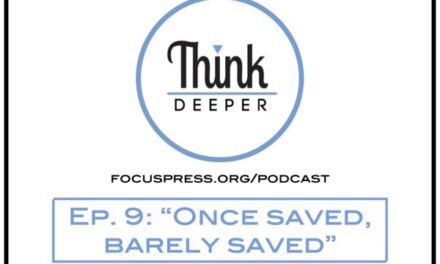In a society that is brimming with foul language on every front – the workplace, social settings, television and movies, music, and even politics – and the language growing worse all the time, the worst words of all almost slip under the radar.
With so many to choose from, which ones are “the worst?” Those which profane God’s names, of course. “OMG,” “Lord,” and the name of our Savior are a few common exclamations used by many, and sadly that includes many Christians.
While the movie rating system and FCC might rank other words as being far more vulgar and severe, and in our heads we might classify them the same, no word can be worse than bringing the holy name of God low and using it meaninglessly.
That being the case, we as Christians especially must guard our speech in these matters. As always, it’s not just a negative commandment (“thou shalt not”) but must be replaced with the positive as well (“thou shalt”).
Our talk should reveal 3 things about our relationship with God:
1. Our talk should reveal we believe God is real
It’s always strange to hear an atheist or agnostic use one of these phrases referencing God’s name, knowing the words mean absolutely nothing to them. But that’s the same message a Christian sends when they use similar language. If we’re speaking of God, we had better mean it.
Think about how much emphasis Scripture puts on the concept of God’s name. We are not to take His name in vain (Exodus 20:7). There is no other name than Jesus by which we may be saved (Acts 4:12). We are to do all in the name of the Lord Jesus (Colossians 3:17). The I AM name given at the burning bush carried a heavy weight for Israel.
These are more than just words we are speaking when we use any of them – God, Jehovah/Yahweh, Jesus, Christ, Lord, etc. When we use them, it should be only to refer to the very real, all-powerful, holy God we serve.
2. Our talk should reveal we fear Him
The idea of fearing God is one that nonbelievers hate and Christians are tempted to shy away from. But it’s a foundational truth in Scripture that a rightly applied fear of God is an indispensable part of having a relationship with Him. Read through Moses’ encounter with God at the Burning Bush in Exodus 3, then God’s response toward Pharaoh’s disrespect in the chapters that follow, and ultimately the events of Sinai in which God descended on the mountain with smoke, flames, lightning, and thunder.
The people of Israel were right to tremble in such circumstances, and we should respond in kind as well. A rightly applied fear of God is not a choice between reverent respect and terror. Rather, it’s equal parts of both, in their proper place.
With this proper fear in place, we learn some things are too important to be discussed flippantly or mockingly. Understanding the need to keep the separation between the holy and profane should keep us from carelessly uttering phrases like “Oh my G**,” “J*s*s Chr*st,” “Good L*rd,” and the like. It should also deter us from repeating jokes based on such disrespect, like the “God and Peter were out on the golf course…” variety. The evangelical punny t-shirts and social media posts are also regular sources of irreverence. A Budweiser-esque shirt with “His blood’s for you” (parodying their “This Bud’s for you” slogan) comes to mind, but there were and are dozens of similar examples.
In short, there are countless ways to disrespect and profane God’s name, but only one way to properly revere Him. Our words should reveal which way we’ve chosen.
3. Our talk should reveal we love Him
Finally, from the way we talk about God the people around us should be able to perceive that we love Him. If your friend is constantly referring to his wife in a derogatory manner or speaks of her without love and respect in his tone, the conclusion you’ll draw is that he doesn’t care for her very much. If the world sees us using God’s name just as thoughtlessly and carelessly as they do, they will not pick up on a love for Him in our hearts.
There are many reasons we should be in the habit of being in the Psalms regularly, and this is yet another of them. The more we read the Psalms, the more our vocabulary is filled with words of adoration and love toward our God. The more we put such thoughts in our heads and our hearts, the more they will come out of our mouths (Luke 6:45).
If you’re in the habit of using these phrases, I hope you’ll get out of the habit starting today. I understand that long-used ways of speaking are hard to drop overnight. They can be so ingrained in us that we don’t even know when we’re doing it. That’s no excuse for disrespecting our God, though. If you have to, ask those around you to mention it when you say such words.
On the other hand, if you’re not in the habit but you notice your family or Christian brethren saying such words, have the love and respect for our God to point it out to them. Our goal, as in all things, is simply to be pleasing to Him (Colossians 1:10).





